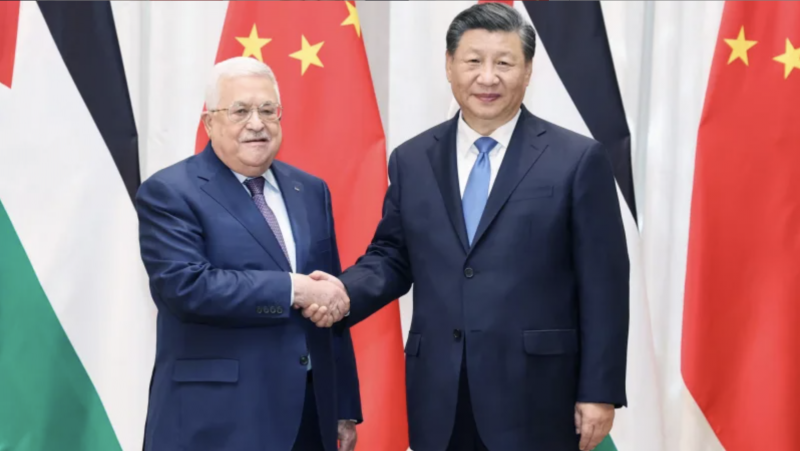
Palestinian Authority President Mahmoud Abbas and Chinese President Xi Jinping in Riyadh, Saudi Arabia, during a Sino-Arab summit, Dec. 8, 2022. (Credit: Yao Dawei/AFP)
China “firmly supports internal reconciliation among different factions of Palestine through dialogue,” as part of Beijing’s measures seeking an immediate cease-fire in Gaza.
In an interview with Qatar’s Al Jazeera, Chinese Foreign Minister Wang Yi implicitly confirmed reports that officials from Mahmoud Abbas’s Fatah, and Hamas met in Beijing on Friday.
The meeting came in an attempt to end their differences and bring about a reconciliation under China's leadership. China has yet to make the meeting official.
A Fatah official told Reuters on Friday that a delegation, led by Azzam al-Ahmad, a member of Fatah’s central and executive committees, had left for China.
A Hamas official said that the faction’s team for the talks, led by Moussa Abou Marzouk, deputy head of the political bureau, would fly there later on Friday. That is a first for the Islamist movement since Oct. 7.
The two factions fought a fratricidal war after the 2006 elections, which led to Hamas fighters expelling Fatah from the Gaza Strip. Hamas has ruled the strip since 2007.
The reconciliation attempts by various parties have so far been unsuccessful. The most recent is Moscow’s attempt in February when it invited dozens of Palestinian factions for inter-Palestinian talks.
In 2022, Algeria enabled an agreement to be signed between some 15 parties, providing for elections to be held within a year. This promise went unheeded.
Symbolic agreement
Between the movement leading the Palestinian Authority (PA) in Ramallah and the Islamist group, classified as a “terrorist group” by many Western countries, hopes of an agreement are slim, given the many obstacles and deep-seated animosity.
But China sees in this attempt a golden opportunity to increase its geopolitical weight in the Middle East, after the diplomatic coup of March 2023, when it succeeded in bringing about a historic détente agreement between Saudi Arabia and Iran. That is added to weighing in on the post-war plan for the region.
China, which underscored its pro-Palestinian stance since the start of the Gaza war on Oct. 7, also hopes to draw at least one symbolic agreement from this sequence, to assert itself as the leader of the “Global South.”
Beijing had already offered its mediation services in the Israeli-Palestinian conflict on numerous occasions in the past, without ever being taken seriously.
In mid-March, China’s Foreign Ministry’s envoy, Wang Kejian, visited the Middle East. Now, this visit seems to have served as preparation for the Fatah-Hamas meeting in China. Kejian had met with Palestinian Foreign Minister Riyad al-Malki in Ramallah, and Hamas’ Political Bureau Head Ismail Haniyeh in Qatar, to exchange views on the Gaza war.
China thus seems to have opted for the simplest and most effective solution, unlike the other two foreign heavyweights in the region. On the one hand, the US, which has been out of touch with reality on the ground, intends to exclude Hamas from any future political project in Gaza.
On the other hand, Russia brought together a dozen Palestinian factions in Moscow two months ago, including Fatah, Hamas and the Islamic Jihad, to monopolize a Palestinian reconciliation, as a self-proclaimed leader of the “Global South.”
This attempt could bring progress. Above all, China seems to act pragmatically. Faced with the explosion of Hamas’ popularity in the Arab world and among Palestinians — except among Gazans, where the movement is increasingly contested — it is aware that things will be difficult without Hamas in post-war Gaza. The US and Israel reject this prospect. Beijing has in recent years strengthened its partnership with Iran and has sufficient financial resources to invest in the enclave’s reconstruction.
Laying down arms
The Beijing meeting took place the day after Khalil al-Hayya, a Hamas political bureau official, told the Associated Press that the Islamist movement would lay down its arms and convert into a political party if a Palestinian state is established within the 1967 borders. This would provide more favorable ground for the Chinese initiative.
“The US media described Khalil al-Hayya’s statement as a ‘major change in Hamas’ position’,” namely in its willingness to make concessions on issues including reconciliation with Fatah and negotiations with Israel, wrote Shao Yongling, a military strategy specialist at a Chinese army school, on the Phoenix News website, quoted by Israeli researcher Tuvia Gering. If Hamas’ position is softened, “it is not impossible for China to mediate a reconciliation between Palestinian factions.”
As Washington struggles to impose its post-war vision on its Israeli ally, the inter-Palestinian meeting in Beijing came on the heels of Secretary of State Antony Blinken’s three-day visit to China. Blinken was then scheduled to travel to Saudi Arabia and Israel.
This article was originally published in L'Orient-Le Jour. Translated by Joelle El Khoury.